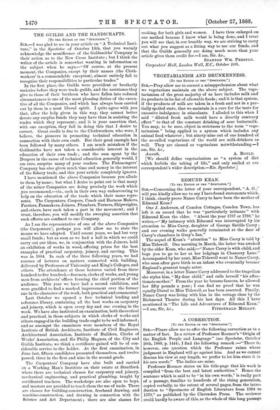THE GUILDS AND THE HANDICRAFTS.
[To THE EDITOR OF THE " SPECTATOR:1
SIR,—I was glad to see in your article on "A Technical Insti- tute," in the Spectator of October 13th, that you warmly
acknowledge the munificence of the Goldsmiths' Company in their action as to the New Cross Institute ; but I think the writer of the article is somewhat wanting in information on the subject when he says,—" Of course, at the present moment, the Companies, except by their names (the Cloth- workers' is a commendable exception), almost entirely fail to recognise their responsibilities to particular trades."
In the first place, the Guilds were provident or brotherly societies before they were trade guilds, and the assistance they give to those of their brethren who have fallen into reduced circumstances is one of the most pleasing duties of the execu- tive of all the Companies, and which has always been carried out by them in a most liberal spirit. I quite agree with you that, after the help given in this way, they cannot better devote any surplus funds they may have than in assisting the trades which they represent ; and it is your assertion that, with one exception, they fail in doing this that I desire to correct. Great credit is due to the Clothworkers, who were, I believe, the pioneers in promoting technical education in connection with their own craft. But their good example has been followed by many others. I am much mistaken if the Goldsmiths have not taken a considerable interest in the education of their own trade ; and the sum spent by the Drapers in the cause of technical education generally would, I am sure, surprise many of your readers. The Fishmongers' Company has also given much time and money in the interest of the fishery trade, and this your article completely ignores.
I have mentioned the above Companies because you allude to them by name; but what I desire to point out is that many of the minor Companies are doing precisely the work which you recommend,—viz., each in their own way endeavouring to help on the education of the trade which their name repre- sents. The Carpenters, Coopers, Coach and Harness Makers, Farriers, Fanmakers, Joiners, Plumbers, Turners, Shipwrights, and others, have each taken a part in the movement; and I trust, therefore, you will modify the sweeping assertion that such efforts are confined to one Company.
As I am the representative of one of the above Companies (the Carpenters'), perhaps you will allow me to state the means we have adopted. Until recent years, we had but very small funds ; but as soon as we had a hall in which we could carry out our ideas, we, in conjunction with the Joiners, held an exhibition of works in wood, offering prizes for the best examples of practical carpentry, joinery, and carving. This was in 1884. In each of the three following years, we had courses of lectures on matters connected with building, delivered by Professors of University and King's Colleges, and others. The attendance at these lectures varied from three hundred to five hundred,—foremen, clerks of works, and young men from architects' offices forming the chief portion of the audience. This year we have had a second exhibition, and were gratified to find a marked improvement over the former One in the character of the work, both practical and ornamental.
Last October we opened a free technical lending and reference library, containing all the best works on carpentry and joinery, which is open every day and one evening in the week. We have also instituted an examination, both theoretical and practical, in those subjects in which clerks of works and others engaged in the building trade ought to be well informed ; and as amongst the examiners were members of the Royal Institute of British Architects, Institute of Civil Engineers, Architectural Association, Institute of Builders, Clerks of Works' Association, and Sir Philip Magnus, of the City and Guilds Institute, we think a certificate gained will be of con- siderable service to the holder. At the first examination, in June last, fifteen candidates presented themselves, and twelve passed, three in the first and nine in the second grade.
The Carpenters' Company have also built and carried on a Working Man's Institute on their estate at Stratford, where there are technic-al classes for carpentry and joinery, mechanical engineering, and practical plumbing, taught by certificated teachers. The workshops are also open to boys, and masters are provided to teach them the use of tools. There are classes for building-construction, freehand drawing, and machine-construction, and drawing in connection with the Science and Art Department ; there are also classes for cooking, for both girls and women. I have thus enlarged on our method because I blow what is being done, and I trust you will see that, in our humble way, we are striving to carry out what you suggest as a fitting way to use our funds, and that the Guilds generally are doing much more than your article gives them credit for.—I am, Sir, &c.,
STANTON WM. PRESTON.
Carpenters' Hall, London Wall, B.C., October 16th.






































 Previous page
Previous page